Entrepreneurship and Small Business Management Report: Case Studies
VerifiedAdded on 2020/01/07
|10
|2863
|201
Report
AI Summary
This report on entrepreneurship and small business management delves into various types of entrepreneurial ventures, including small business ventures, scalable start-up ventures, large company ventures, social ventures, and lifestyle entrepreneurship. It explores the characteristics and skills of successful entrepreneurs, using Elizabeth Gooch and Tom Mercer as case studies. The report analyzes the entrepreneurial personality, highlighting the importance of motivation, risk-taking, and determination. It also examines the impact of personal background and experience on entrepreneurial success, drawing parallels with Donald Trump and Jack Ma. The report concludes by emphasizing the significance of small businesses in the economy and how personal experiences can contribute to entrepreneurial success.
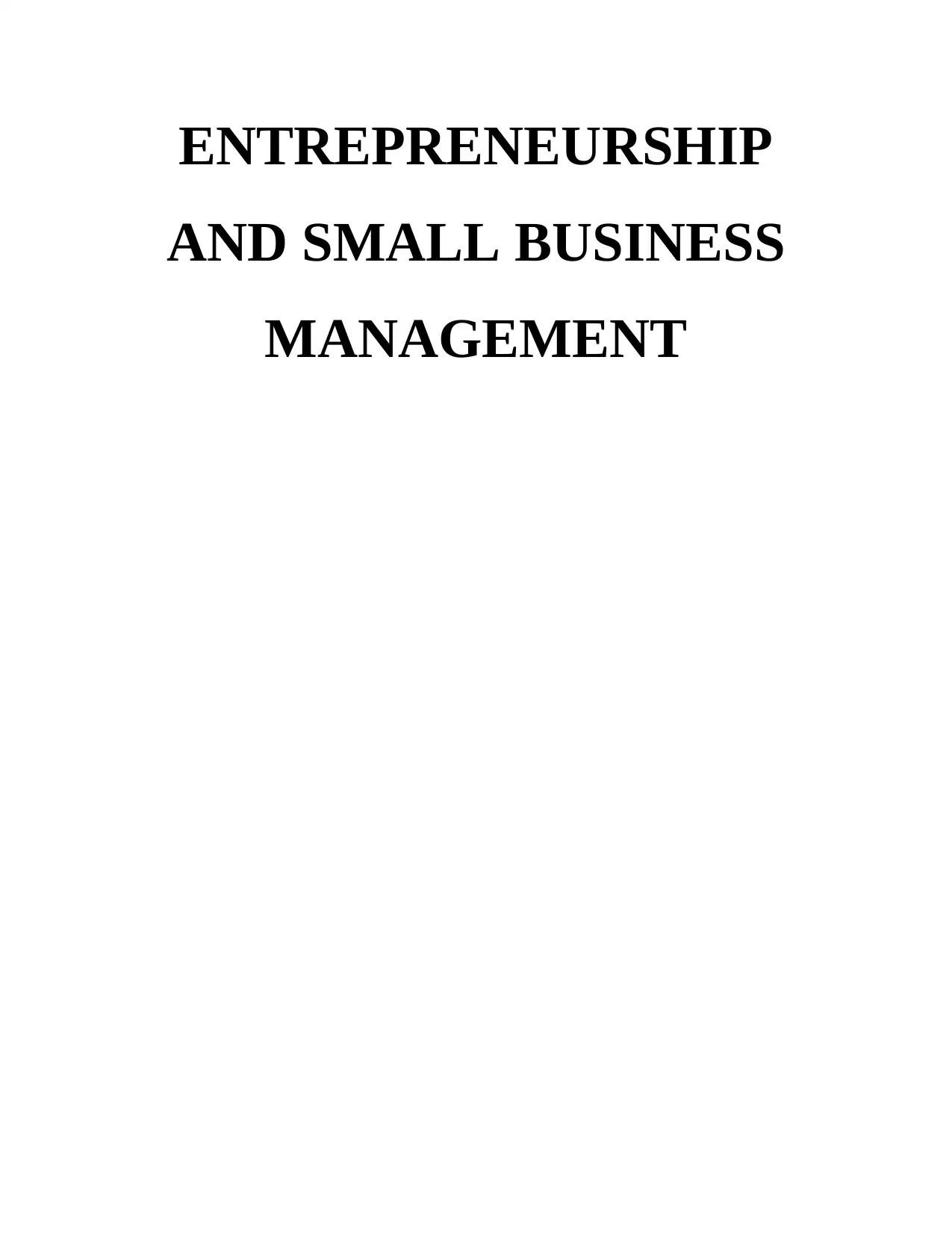
ENTREPRENEURSHIP
AND SMALL BUSINESS
MANAGEMENT
AND SMALL BUSINESS
MANAGEMENT
Paraphrase This Document
Need a fresh take? Get an instant paraphrase of this document with our AI Paraphraser
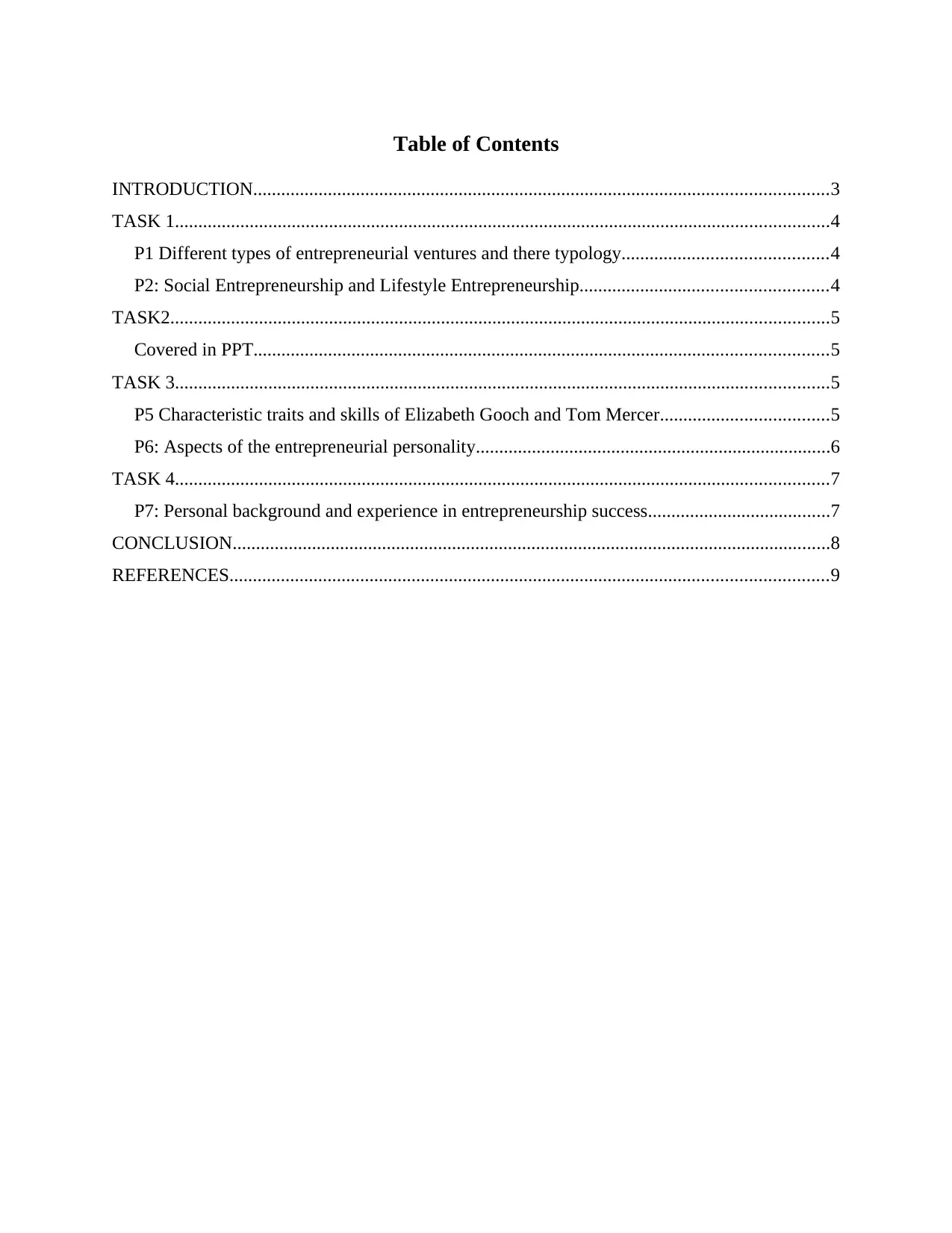
Table of Contents
INTRODUCTION...........................................................................................................................3
TASK 1............................................................................................................................................4
P1 Different types of entrepreneurial ventures and there typology............................................4
P2: Social Entrepreneurship and Lifestyle Entrepreneurship.....................................................4
TASK2.............................................................................................................................................5
Covered in PPT...........................................................................................................................5
TASK 3............................................................................................................................................5
P5 Characteristic traits and skills of Elizabeth Gooch and Tom Mercer....................................5
P6: Aspects of the entrepreneurial personality............................................................................6
TASK 4............................................................................................................................................7
P7: Personal background and experience in entrepreneurship success.......................................7
CONCLUSION................................................................................................................................8
REFERENCES................................................................................................................................9
INTRODUCTION...........................................................................................................................3
TASK 1............................................................................................................................................4
P1 Different types of entrepreneurial ventures and there typology............................................4
P2: Social Entrepreneurship and Lifestyle Entrepreneurship.....................................................4
TASK2.............................................................................................................................................5
Covered in PPT...........................................................................................................................5
TASK 3............................................................................................................................................5
P5 Characteristic traits and skills of Elizabeth Gooch and Tom Mercer....................................5
P6: Aspects of the entrepreneurial personality............................................................................6
TASK 4............................................................................................................................................7
P7: Personal background and experience in entrepreneurship success.......................................7
CONCLUSION................................................................................................................................8
REFERENCES................................................................................................................................9
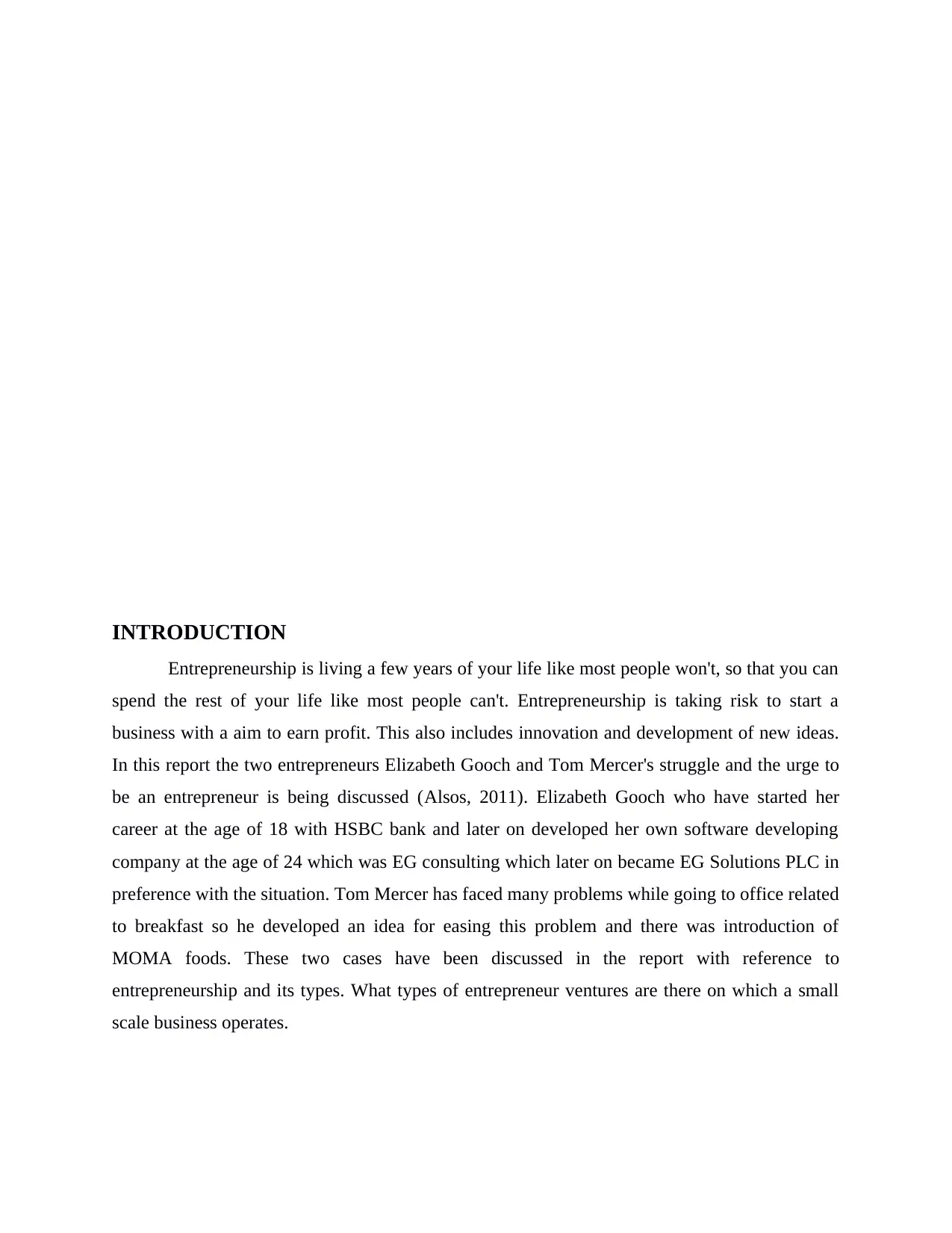
INTRODUCTION
Entrepreneurship is living a few years of your life like most people won't, so that you can
spend the rest of your life like most people can't. Entrepreneurship is taking risk to start a
business with a aim to earn profit. This also includes innovation and development of new ideas.
In this report the two entrepreneurs Elizabeth Gooch and Tom Mercer's struggle and the urge to
be an entrepreneur is being discussed (Alsos, 2011). Elizabeth Gooch who have started her
career at the age of 18 with HSBC bank and later on developed her own software developing
company at the age of 24 which was EG consulting which later on became EG Solutions PLC in
preference with the situation. Tom Mercer has faced many problems while going to office related
to breakfast so he developed an idea for easing this problem and there was introduction of
MOMA foods. These two cases have been discussed in the report with reference to
entrepreneurship and its types. What types of entrepreneur ventures are there on which a small
scale business operates.
Entrepreneurship is living a few years of your life like most people won't, so that you can
spend the rest of your life like most people can't. Entrepreneurship is taking risk to start a
business with a aim to earn profit. This also includes innovation and development of new ideas.
In this report the two entrepreneurs Elizabeth Gooch and Tom Mercer's struggle and the urge to
be an entrepreneur is being discussed (Alsos, 2011). Elizabeth Gooch who have started her
career at the age of 18 with HSBC bank and later on developed her own software developing
company at the age of 24 which was EG consulting which later on became EG Solutions PLC in
preference with the situation. Tom Mercer has faced many problems while going to office related
to breakfast so he developed an idea for easing this problem and there was introduction of
MOMA foods. These two cases have been discussed in the report with reference to
entrepreneurship and its types. What types of entrepreneur ventures are there on which a small
scale business operates.
⊘ This is a preview!⊘
Do you want full access?
Subscribe today to unlock all pages.

Trusted by 1+ million students worldwide
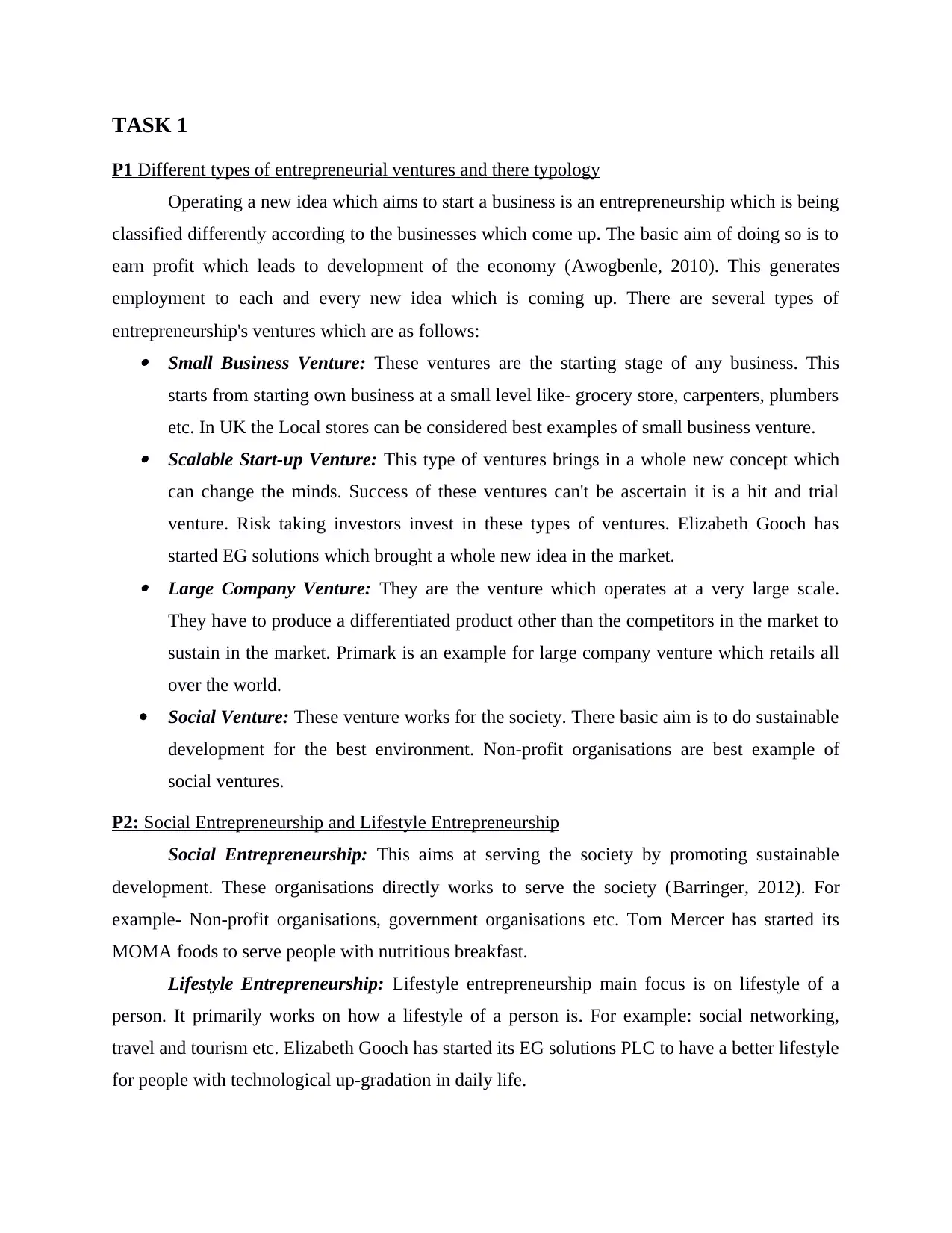
TASK 1
P1 Different types of entrepreneurial ventures and there typology
Operating a new idea which aims to start a business is an entrepreneurship which is being
classified differently according to the businesses which come up. The basic aim of doing so is to
earn profit which leads to development of the economy (Awogbenle, 2010). This generates
employment to each and every new idea which is coming up. There are several types of
entrepreneurship's ventures which are as follows: Small Business Venture: These ventures are the starting stage of any business. This
starts from starting own business at a small level like- grocery store, carpenters, plumbers
etc. In UK the Local stores can be considered best examples of small business venture. Scalable Start-up Venture: This type of ventures brings in a whole new concept which
can change the minds. Success of these ventures can't be ascertain it is a hit and trial
venture. Risk taking investors invest in these types of ventures. Elizabeth Gooch has
started EG solutions which brought a whole new idea in the market. Large Company Venture: They are the venture which operates at a very large scale.
They have to produce a differentiated product other than the competitors in the market to
sustain in the market. Primark is an example for large company venture which retails all
over the world.
Social Venture: These venture works for the society. There basic aim is to do sustainable
development for the best environment. Non-profit organisations are best example of
social ventures.
P2: Social Entrepreneurship and Lifestyle Entrepreneurship
Social Entrepreneurship: This aims at serving the society by promoting sustainable
development. These organisations directly works to serve the society (Barringer, 2012). For
example- Non-profit organisations, government organisations etc. Tom Mercer has started its
MOMA foods to serve people with nutritious breakfast.
Lifestyle Entrepreneurship: Lifestyle entrepreneurship main focus is on lifestyle of a
person. It primarily works on how a lifestyle of a person is. For example: social networking,
travel and tourism etc. Elizabeth Gooch has started its EG solutions PLC to have a better lifestyle
for people with technological up-gradation in daily life.
P1 Different types of entrepreneurial ventures and there typology
Operating a new idea which aims to start a business is an entrepreneurship which is being
classified differently according to the businesses which come up. The basic aim of doing so is to
earn profit which leads to development of the economy (Awogbenle, 2010). This generates
employment to each and every new idea which is coming up. There are several types of
entrepreneurship's ventures which are as follows: Small Business Venture: These ventures are the starting stage of any business. This
starts from starting own business at a small level like- grocery store, carpenters, plumbers
etc. In UK the Local stores can be considered best examples of small business venture. Scalable Start-up Venture: This type of ventures brings in a whole new concept which
can change the minds. Success of these ventures can't be ascertain it is a hit and trial
venture. Risk taking investors invest in these types of ventures. Elizabeth Gooch has
started EG solutions which brought a whole new idea in the market. Large Company Venture: They are the venture which operates at a very large scale.
They have to produce a differentiated product other than the competitors in the market to
sustain in the market. Primark is an example for large company venture which retails all
over the world.
Social Venture: These venture works for the society. There basic aim is to do sustainable
development for the best environment. Non-profit organisations are best example of
social ventures.
P2: Social Entrepreneurship and Lifestyle Entrepreneurship
Social Entrepreneurship: This aims at serving the society by promoting sustainable
development. These organisations directly works to serve the society (Barringer, 2012). For
example- Non-profit organisations, government organisations etc. Tom Mercer has started its
MOMA foods to serve people with nutritious breakfast.
Lifestyle Entrepreneurship: Lifestyle entrepreneurship main focus is on lifestyle of a
person. It primarily works on how a lifestyle of a person is. For example: social networking,
travel and tourism etc. Elizabeth Gooch has started its EG solutions PLC to have a better lifestyle
for people with technological up-gradation in daily life.
Paraphrase This Document
Need a fresh take? Get an instant paraphrase of this document with our AI Paraphraser
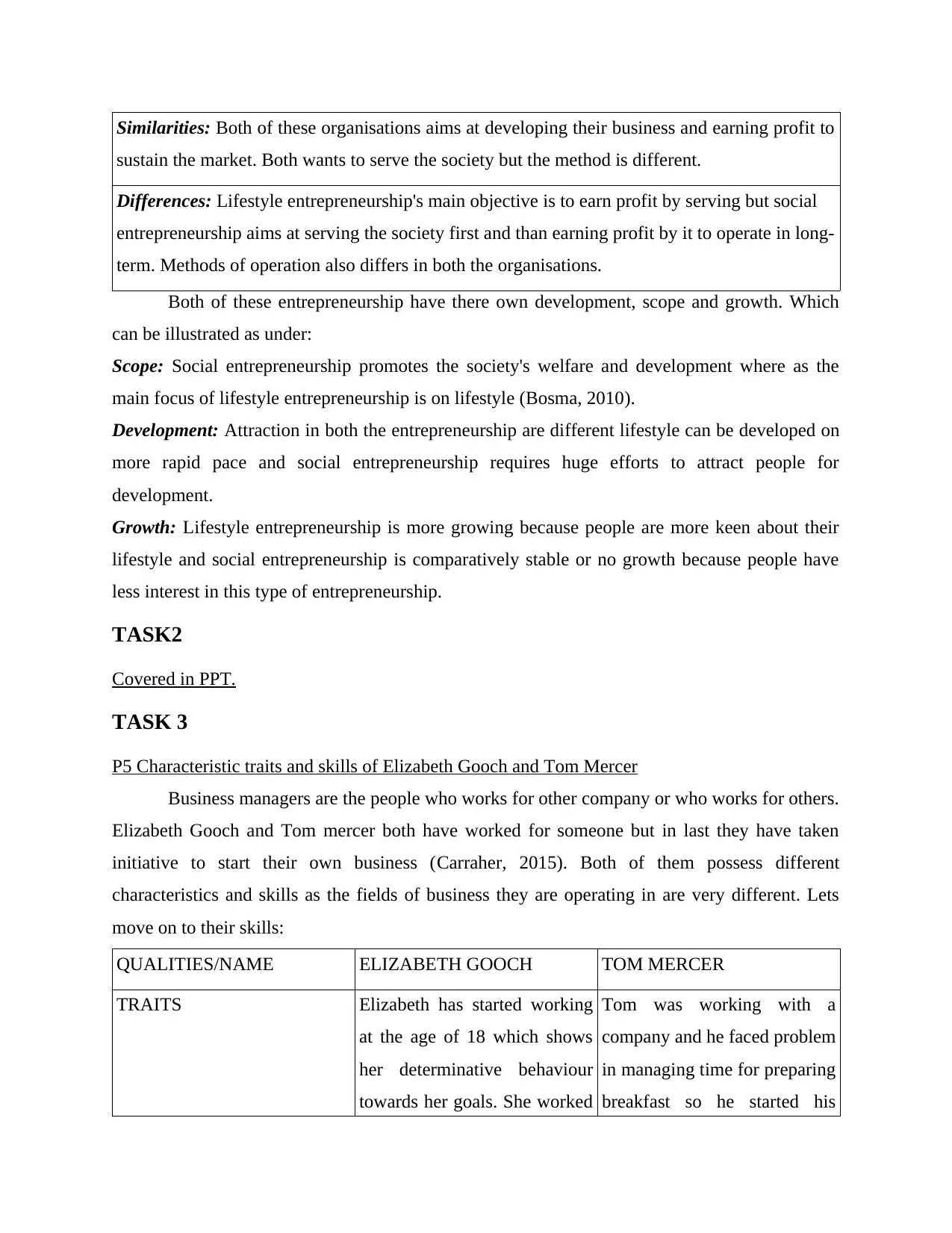
Similarities: Both of these organisations aims at developing their business and earning profit to
sustain the market. Both wants to serve the society but the method is different.
Differences: Lifestyle entrepreneurship's main objective is to earn profit by serving but social
entrepreneurship aims at serving the society first and than earning profit by it to operate in long-
term. Methods of operation also differs in both the organisations.
Both of these entrepreneurship have there own development, scope and growth. Which
can be illustrated as under:
Scope: Social entrepreneurship promotes the society's welfare and development where as the
main focus of lifestyle entrepreneurship is on lifestyle (Bosma, 2010).
Development: Attraction in both the entrepreneurship are different lifestyle can be developed on
more rapid pace and social entrepreneurship requires huge efforts to attract people for
development.
Growth: Lifestyle entrepreneurship is more growing because people are more keen about their
lifestyle and social entrepreneurship is comparatively stable or no growth because people have
less interest in this type of entrepreneurship.
TASK2
Covered in PPT.
TASK 3
P5 Characteristic traits and skills of Elizabeth Gooch and Tom Mercer
Business managers are the people who works for other company or who works for others.
Elizabeth Gooch and Tom mercer both have worked for someone but in last they have taken
initiative to start their own business (Carraher, 2015). Both of them possess different
characteristics and skills as the fields of business they are operating in are very different. Lets
move on to their skills:
QUALITIES/NAME ELIZABETH GOOCH TOM MERCER
TRAITS Elizabeth has started working
at the age of 18 which shows
her determinative behaviour
towards her goals. She worked
Tom was working with a
company and he faced problem
in managing time for preparing
breakfast so he started his
sustain the market. Both wants to serve the society but the method is different.
Differences: Lifestyle entrepreneurship's main objective is to earn profit by serving but social
entrepreneurship aims at serving the society first and than earning profit by it to operate in long-
term. Methods of operation also differs in both the organisations.
Both of these entrepreneurship have there own development, scope and growth. Which
can be illustrated as under:
Scope: Social entrepreneurship promotes the society's welfare and development where as the
main focus of lifestyle entrepreneurship is on lifestyle (Bosma, 2010).
Development: Attraction in both the entrepreneurship are different lifestyle can be developed on
more rapid pace and social entrepreneurship requires huge efforts to attract people for
development.
Growth: Lifestyle entrepreneurship is more growing because people are more keen about their
lifestyle and social entrepreneurship is comparatively stable or no growth because people have
less interest in this type of entrepreneurship.
TASK2
Covered in PPT.
TASK 3
P5 Characteristic traits and skills of Elizabeth Gooch and Tom Mercer
Business managers are the people who works for other company or who works for others.
Elizabeth Gooch and Tom mercer both have worked for someone but in last they have taken
initiative to start their own business (Carraher, 2015). Both of them possess different
characteristics and skills as the fields of business they are operating in are very different. Lets
move on to their skills:
QUALITIES/NAME ELIZABETH GOOCH TOM MERCER
TRAITS Elizabeth has started working
at the age of 18 which shows
her determinative behaviour
towards her goals. She worked
Tom was working with a
company and he faced problem
in managing time for preparing
breakfast so he started his
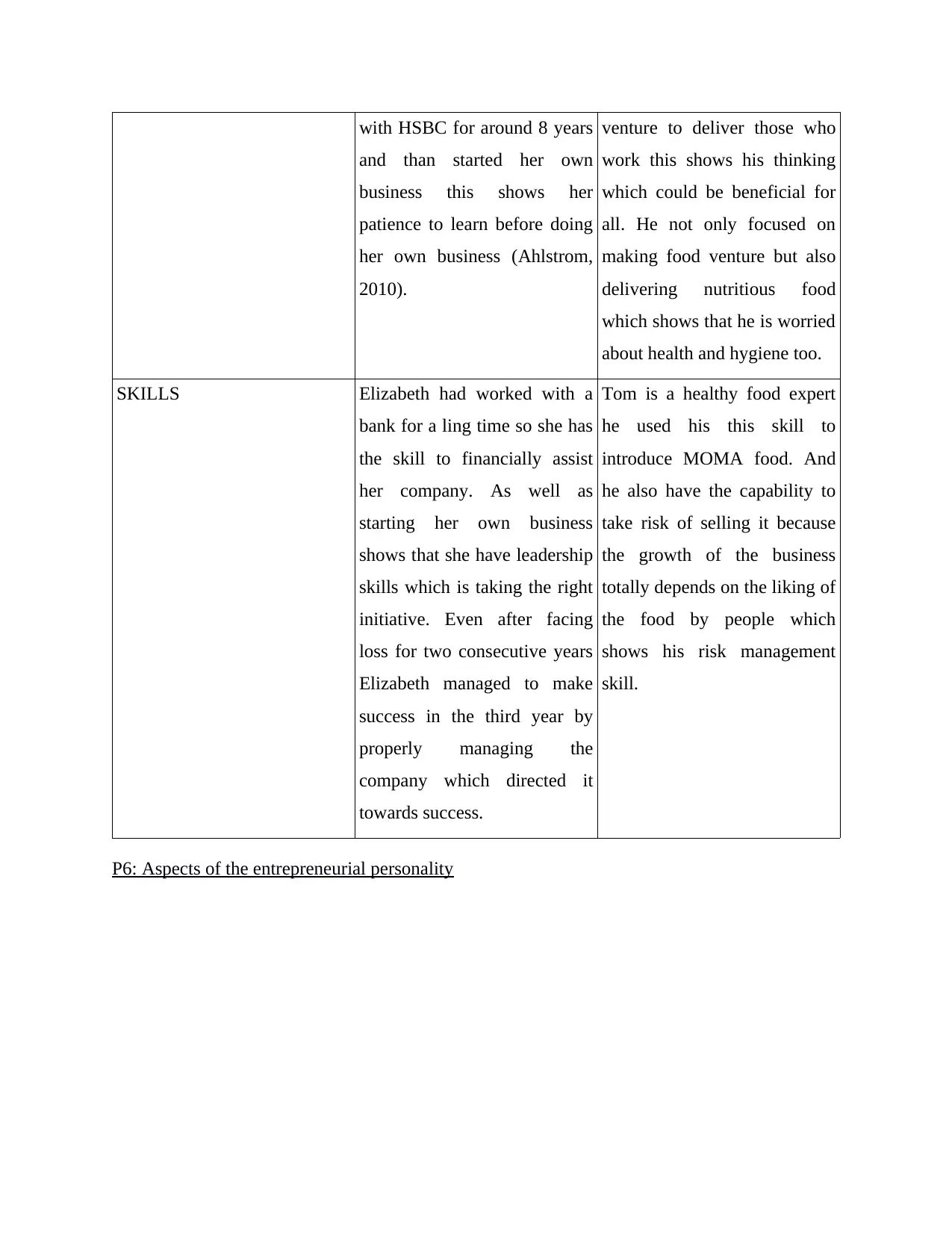
with HSBC for around 8 years
and than started her own
business this shows her
patience to learn before doing
her own business (Ahlstrom,
2010).
venture to deliver those who
work this shows his thinking
which could be beneficial for
all. He not only focused on
making food venture but also
delivering nutritious food
which shows that he is worried
about health and hygiene too.
SKILLS Elizabeth had worked with a
bank for a ling time so she has
the skill to financially assist
her company. As well as
starting her own business
shows that she have leadership
skills which is taking the right
initiative. Even after facing
loss for two consecutive years
Elizabeth managed to make
success in the third year by
properly managing the
company which directed it
towards success.
Tom is a healthy food expert
he used his this skill to
introduce MOMA food. And
he also have the capability to
take risk of selling it because
the growth of the business
totally depends on the liking of
the food by people which
shows his risk management
skill.
P6: Aspects of the entrepreneurial personality
and than started her own
business this shows her
patience to learn before doing
her own business (Ahlstrom,
2010).
venture to deliver those who
work this shows his thinking
which could be beneficial for
all. He not only focused on
making food venture but also
delivering nutritious food
which shows that he is worried
about health and hygiene too.
SKILLS Elizabeth had worked with a
bank for a ling time so she has
the skill to financially assist
her company. As well as
starting her own business
shows that she have leadership
skills which is taking the right
initiative. Even after facing
loss for two consecutive years
Elizabeth managed to make
success in the third year by
properly managing the
company which directed it
towards success.
Tom is a healthy food expert
he used his this skill to
introduce MOMA food. And
he also have the capability to
take risk of selling it because
the growth of the business
totally depends on the liking of
the food by people which
shows his risk management
skill.
P6: Aspects of the entrepreneurial personality
⊘ This is a preview!⊘
Do you want full access?
Subscribe today to unlock all pages.

Trusted by 1+ million students worldwide
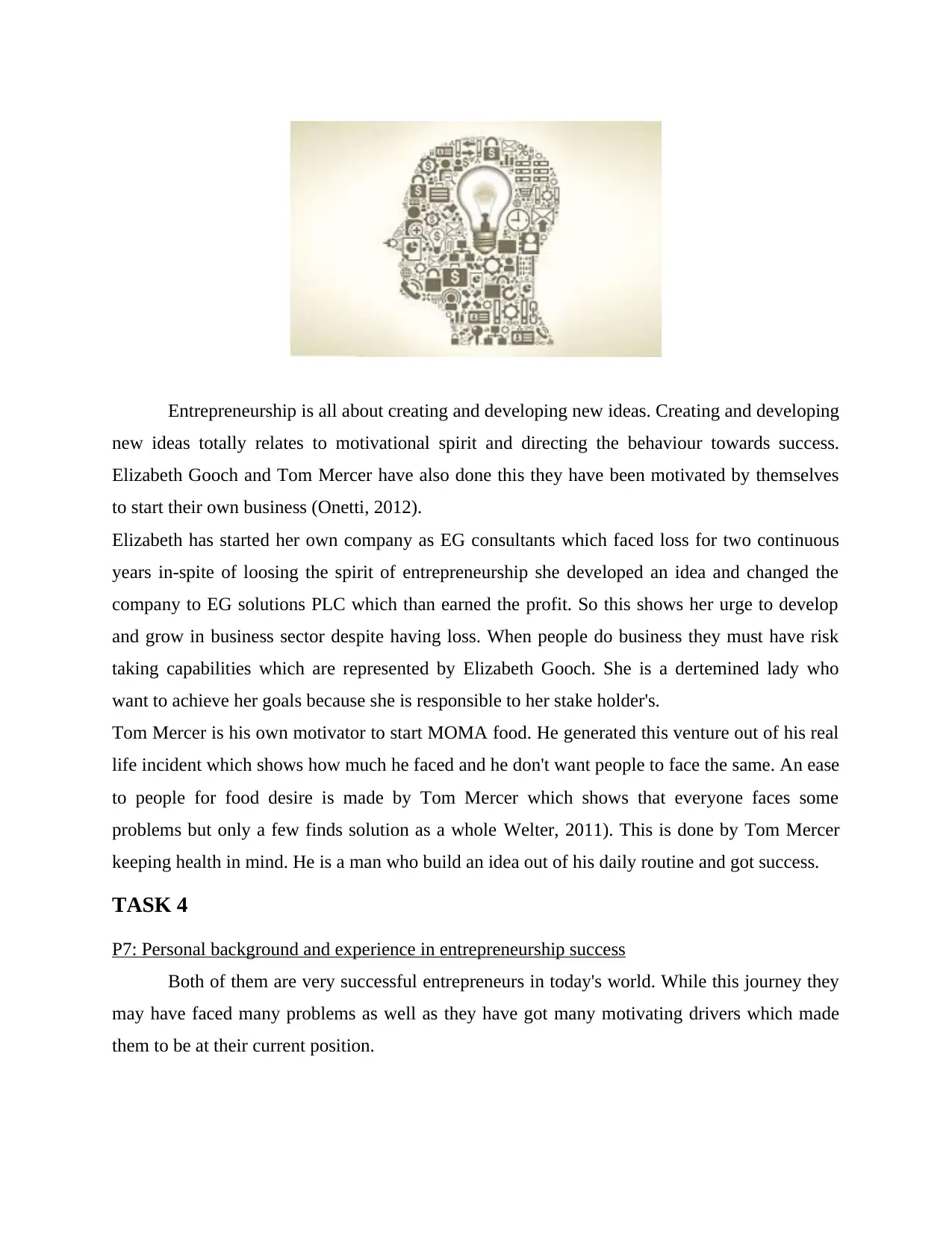
Entrepreneurship is all about creating and developing new ideas. Creating and developing
new ideas totally relates to motivational spirit and directing the behaviour towards success.
Elizabeth Gooch and Tom Mercer have also done this they have been motivated by themselves
to start their own business (Onetti, 2012).
Elizabeth has started her own company as EG consultants which faced loss for two continuous
years in-spite of loosing the spirit of entrepreneurship she developed an idea and changed the
company to EG solutions PLC which than earned the profit. So this shows her urge to develop
and grow in business sector despite having loss. When people do business they must have risk
taking capabilities which are represented by Elizabeth Gooch. She is a dertemined lady who
want to achieve her goals because she is responsible to her stake holder's.
Tom Mercer is his own motivator to start MOMA food. He generated this venture out of his real
life incident which shows how much he faced and he don't want people to face the same. An ease
to people for food desire is made by Tom Mercer which shows that everyone faces some
problems but only a few finds solution as a whole Welter, 2011). This is done by Tom Mercer
keeping health in mind. He is a man who build an idea out of his daily routine and got success.
TASK 4
P7: Personal background and experience in entrepreneurship success
Both of them are very successful entrepreneurs in today's world. While this journey they
may have faced many problems as well as they have got many motivating drivers which made
them to be at their current position.
new ideas totally relates to motivational spirit and directing the behaviour towards success.
Elizabeth Gooch and Tom Mercer have also done this they have been motivated by themselves
to start their own business (Onetti, 2012).
Elizabeth has started her own company as EG consultants which faced loss for two continuous
years in-spite of loosing the spirit of entrepreneurship she developed an idea and changed the
company to EG solutions PLC which than earned the profit. So this shows her urge to develop
and grow in business sector despite having loss. When people do business they must have risk
taking capabilities which are represented by Elizabeth Gooch. She is a dertemined lady who
want to achieve her goals because she is responsible to her stake holder's.
Tom Mercer is his own motivator to start MOMA food. He generated this venture out of his real
life incident which shows how much he faced and he don't want people to face the same. An ease
to people for food desire is made by Tom Mercer which shows that everyone faces some
problems but only a few finds solution as a whole Welter, 2011). This is done by Tom Mercer
keeping health in mind. He is a man who build an idea out of his daily routine and got success.
TASK 4
P7: Personal background and experience in entrepreneurship success
Both of them are very successful entrepreneurs in today's world. While this journey they
may have faced many problems as well as they have got many motivating drivers which made
them to be at their current position.
Paraphrase This Document
Need a fresh take? Get an instant paraphrase of this document with our AI Paraphraser
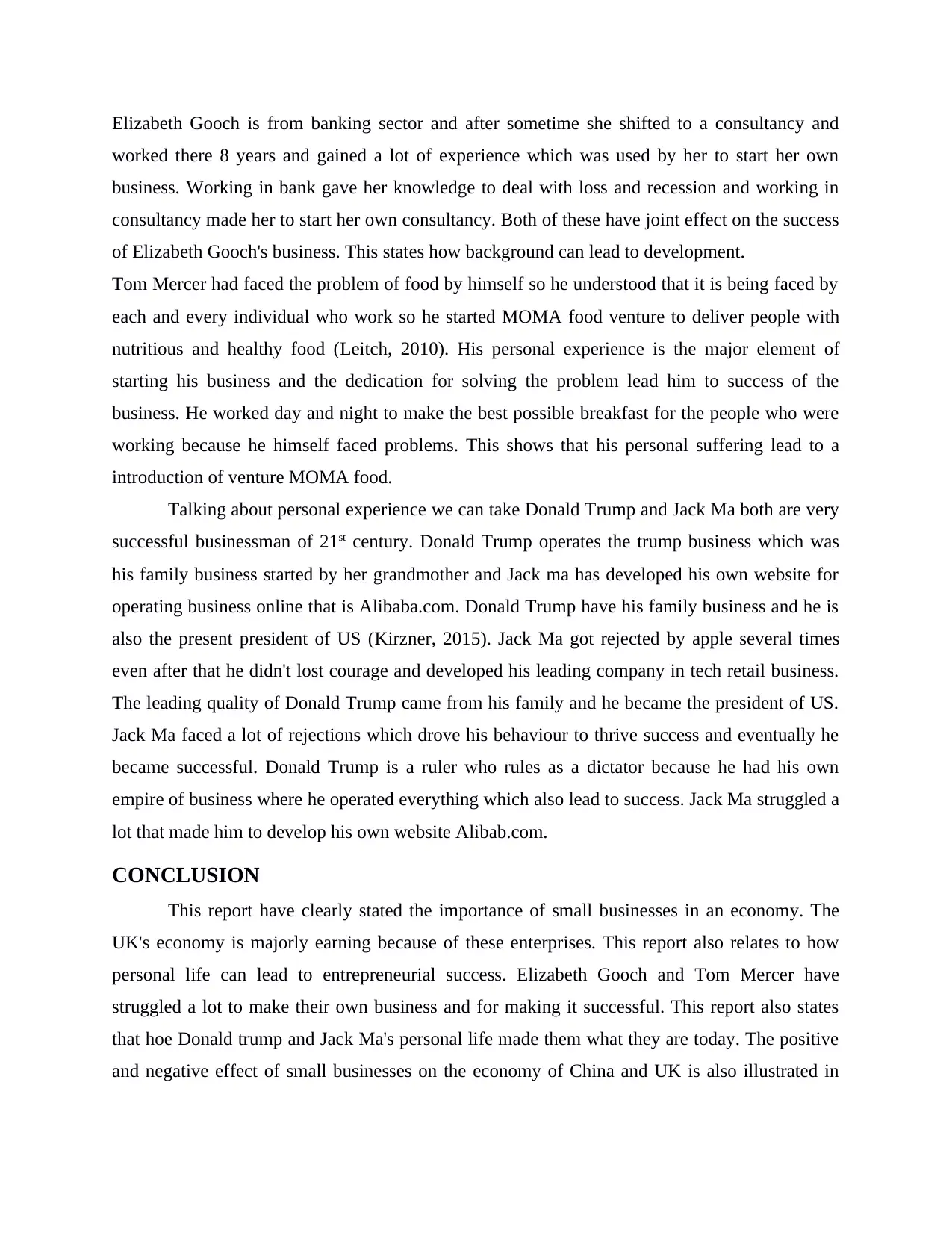
Elizabeth Gooch is from banking sector and after sometime she shifted to a consultancy and
worked there 8 years and gained a lot of experience which was used by her to start her own
business. Working in bank gave her knowledge to deal with loss and recession and working in
consultancy made her to start her own consultancy. Both of these have joint effect on the success
of Elizabeth Gooch's business. This states how background can lead to development.
Tom Mercer had faced the problem of food by himself so he understood that it is being faced by
each and every individual who work so he started MOMA food venture to deliver people with
nutritious and healthy food (Leitch, 2010). His personal experience is the major element of
starting his business and the dedication for solving the problem lead him to success of the
business. He worked day and night to make the best possible breakfast for the people who were
working because he himself faced problems. This shows that his personal suffering lead to a
introduction of venture MOMA food.
Talking about personal experience we can take Donald Trump and Jack Ma both are very
successful businessman of 21st century. Donald Trump operates the trump business which was
his family business started by her grandmother and Jack ma has developed his own website for
operating business online that is Alibaba.com. Donald Trump have his family business and he is
also the present president of US (Kirzner, 2015). Jack Ma got rejected by apple several times
even after that he didn't lost courage and developed his leading company in tech retail business.
The leading quality of Donald Trump came from his family and he became the president of US.
Jack Ma faced a lot of rejections which drove his behaviour to thrive success and eventually he
became successful. Donald Trump is a ruler who rules as a dictator because he had his own
empire of business where he operated everything which also lead to success. Jack Ma struggled a
lot that made him to develop his own website Alibab.com.
CONCLUSION
This report have clearly stated the importance of small businesses in an economy. The
UK's economy is majorly earning because of these enterprises. This report also relates to how
personal life can lead to entrepreneurial success. Elizabeth Gooch and Tom Mercer have
struggled a lot to make their own business and for making it successful. This report also states
that hoe Donald trump and Jack Ma's personal life made them what they are today. The positive
and negative effect of small businesses on the economy of China and UK is also illustrated in
worked there 8 years and gained a lot of experience which was used by her to start her own
business. Working in bank gave her knowledge to deal with loss and recession and working in
consultancy made her to start her own consultancy. Both of these have joint effect on the success
of Elizabeth Gooch's business. This states how background can lead to development.
Tom Mercer had faced the problem of food by himself so he understood that it is being faced by
each and every individual who work so he started MOMA food venture to deliver people with
nutritious and healthy food (Leitch, 2010). His personal experience is the major element of
starting his business and the dedication for solving the problem lead him to success of the
business. He worked day and night to make the best possible breakfast for the people who were
working because he himself faced problems. This shows that his personal suffering lead to a
introduction of venture MOMA food.
Talking about personal experience we can take Donald Trump and Jack Ma both are very
successful businessman of 21st century. Donald Trump operates the trump business which was
his family business started by her grandmother and Jack ma has developed his own website for
operating business online that is Alibaba.com. Donald Trump have his family business and he is
also the present president of US (Kirzner, 2015). Jack Ma got rejected by apple several times
even after that he didn't lost courage and developed his leading company in tech retail business.
The leading quality of Donald Trump came from his family and he became the president of US.
Jack Ma faced a lot of rejections which drove his behaviour to thrive success and eventually he
became successful. Donald Trump is a ruler who rules as a dictator because he had his own
empire of business where he operated everything which also lead to success. Jack Ma struggled a
lot that made him to develop his own website Alibab.com.
CONCLUSION
This report have clearly stated the importance of small businesses in an economy. The
UK's economy is majorly earning because of these enterprises. This report also relates to how
personal life can lead to entrepreneurial success. Elizabeth Gooch and Tom Mercer have
struggled a lot to make their own business and for making it successful. This report also states
that hoe Donald trump and Jack Ma's personal life made them what they are today. The positive
and negative effect of small businesses on the economy of China and UK is also illustrated in

this report. Starting from small leads to something big this the value which is stated by this
report.
report.
⊘ This is a preview!⊘
Do you want full access?
Subscribe today to unlock all pages.

Trusted by 1+ million students worldwide
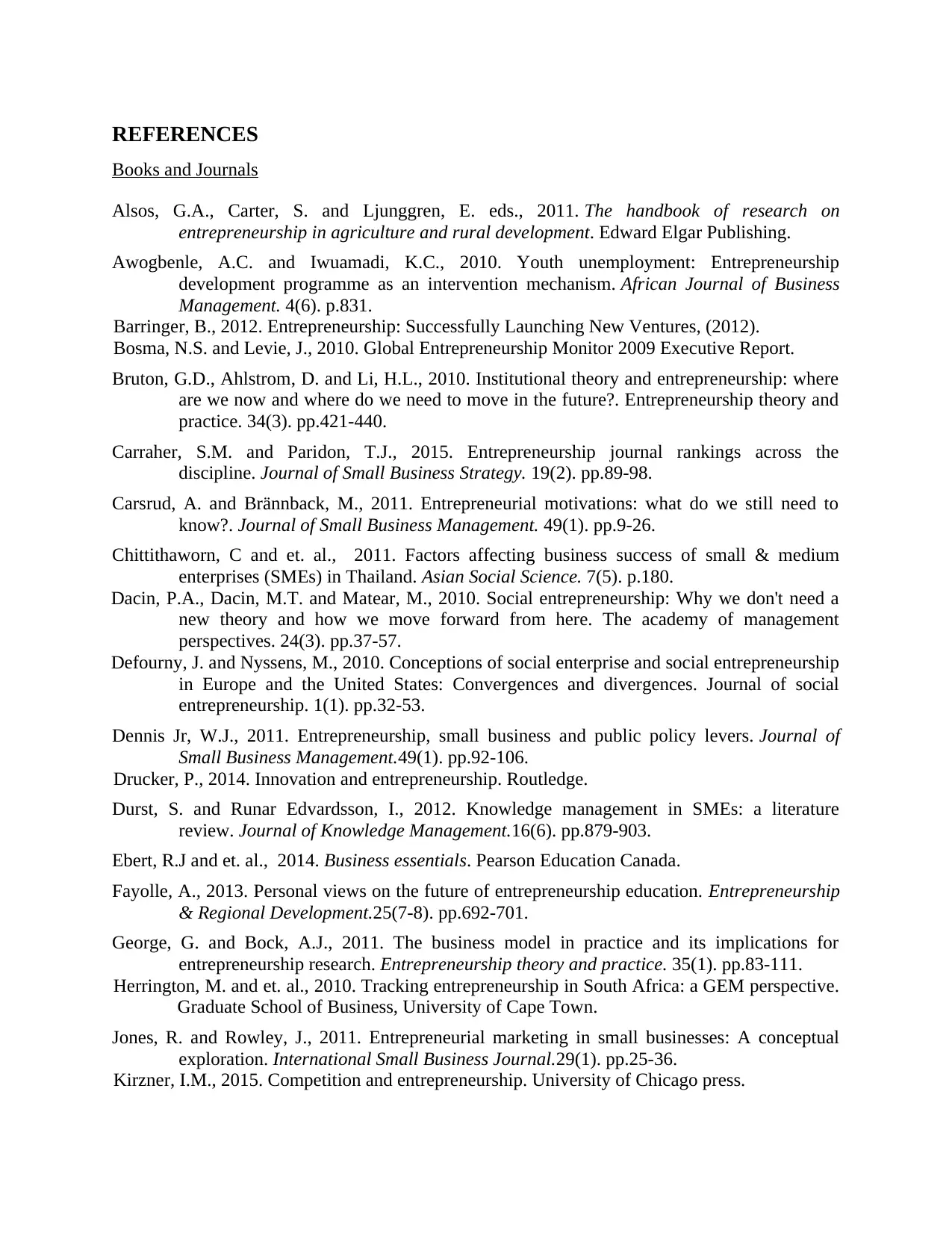
REFERENCES
Books and Journals
Alsos, G.A., Carter, S. and Ljunggren, E. eds., 2011. The handbook of research on
entrepreneurship in agriculture and rural development. Edward Elgar Publishing.
Awogbenle, A.C. and Iwuamadi, K.C., 2010. Youth unemployment: Entrepreneurship
development programme as an intervention mechanism. African Journal of Business
Management. 4(6). p.831.
Barringer, B., 2012. Entrepreneurship: Successfully Launching New Ventures, (2012).
Bosma, N.S. and Levie, J., 2010. Global Entrepreneurship Monitor 2009 Executive Report.
Bruton, G.D., Ahlstrom, D. and Li, H.L., 2010. Institutional theory and entrepreneurship: where
are we now and where do we need to move in the future?. Entrepreneurship theory and
practice. 34(3). pp.421-440.
Carraher, S.M. and Paridon, T.J., 2015. Entrepreneurship journal rankings across the
discipline. Journal of Small Business Strategy. 19(2). pp.89-98.
Carsrud, A. and Brännback, M., 2011. Entrepreneurial motivations: what do we still need to
know?. Journal of Small Business Management. 49(1). pp.9-26.
Chittithaworn, C and et. al., 2011. Factors affecting business success of small & medium
enterprises (SMEs) in Thailand. Asian Social Science. 7(5). p.180.
Dacin, P.A., Dacin, M.T. and Matear, M., 2010. Social entrepreneurship: Why we don't need a
new theory and how we move forward from here. The academy of management
perspectives. 24(3). pp.37-57.
Defourny, J. and Nyssens, M., 2010. Conceptions of social enterprise and social entrepreneurship
in Europe and the United States: Convergences and divergences. Journal of social
entrepreneurship. 1(1). pp.32-53.
Dennis Jr, W.J., 2011. Entrepreneurship, small business and public policy levers. Journal of
Small Business Management.49(1). pp.92-106.
Drucker, P., 2014. Innovation and entrepreneurship. Routledge.
Durst, S. and Runar Edvardsson, I., 2012. Knowledge management in SMEs: a literature
review. Journal of Knowledge Management.16(6). pp.879-903.
Ebert, R.J and et. al., 2014. Business essentials. Pearson Education Canada.
Fayolle, A., 2013. Personal views on the future of entrepreneurship education. Entrepreneurship
& Regional Development.25(7-8). pp.692-701.
George, G. and Bock, A.J., 2011. The business model in practice and its implications for
entrepreneurship research. Entrepreneurship theory and practice. 35(1). pp.83-111.
Herrington, M. and et. al., 2010. Tracking entrepreneurship in South Africa: a GEM perspective.
Graduate School of Business, University of Cape Town.
Jones, R. and Rowley, J., 2011. Entrepreneurial marketing in small businesses: A conceptual
exploration. International Small Business Journal.29(1). pp.25-36.
Kirzner, I.M., 2015. Competition and entrepreneurship. University of Chicago press.
Books and Journals
Alsos, G.A., Carter, S. and Ljunggren, E. eds., 2011. The handbook of research on
entrepreneurship in agriculture and rural development. Edward Elgar Publishing.
Awogbenle, A.C. and Iwuamadi, K.C., 2010. Youth unemployment: Entrepreneurship
development programme as an intervention mechanism. African Journal of Business
Management. 4(6). p.831.
Barringer, B., 2012. Entrepreneurship: Successfully Launching New Ventures, (2012).
Bosma, N.S. and Levie, J., 2010. Global Entrepreneurship Monitor 2009 Executive Report.
Bruton, G.D., Ahlstrom, D. and Li, H.L., 2010. Institutional theory and entrepreneurship: where
are we now and where do we need to move in the future?. Entrepreneurship theory and
practice. 34(3). pp.421-440.
Carraher, S.M. and Paridon, T.J., 2015. Entrepreneurship journal rankings across the
discipline. Journal of Small Business Strategy. 19(2). pp.89-98.
Carsrud, A. and Brännback, M., 2011. Entrepreneurial motivations: what do we still need to
know?. Journal of Small Business Management. 49(1). pp.9-26.
Chittithaworn, C and et. al., 2011. Factors affecting business success of small & medium
enterprises (SMEs) in Thailand. Asian Social Science. 7(5). p.180.
Dacin, P.A., Dacin, M.T. and Matear, M., 2010. Social entrepreneurship: Why we don't need a
new theory and how we move forward from here. The academy of management
perspectives. 24(3). pp.37-57.
Defourny, J. and Nyssens, M., 2010. Conceptions of social enterprise and social entrepreneurship
in Europe and the United States: Convergences and divergences. Journal of social
entrepreneurship. 1(1). pp.32-53.
Dennis Jr, W.J., 2011. Entrepreneurship, small business and public policy levers. Journal of
Small Business Management.49(1). pp.92-106.
Drucker, P., 2014. Innovation and entrepreneurship. Routledge.
Durst, S. and Runar Edvardsson, I., 2012. Knowledge management in SMEs: a literature
review. Journal of Knowledge Management.16(6). pp.879-903.
Ebert, R.J and et. al., 2014. Business essentials. Pearson Education Canada.
Fayolle, A., 2013. Personal views on the future of entrepreneurship education. Entrepreneurship
& Regional Development.25(7-8). pp.692-701.
George, G. and Bock, A.J., 2011. The business model in practice and its implications for
entrepreneurship research. Entrepreneurship theory and practice. 35(1). pp.83-111.
Herrington, M. and et. al., 2010. Tracking entrepreneurship in South Africa: a GEM perspective.
Graduate School of Business, University of Cape Town.
Jones, R. and Rowley, J., 2011. Entrepreneurial marketing in small businesses: A conceptual
exploration. International Small Business Journal.29(1). pp.25-36.
Kirzner, I.M., 2015. Competition and entrepreneurship. University of Chicago press.
1 out of 10
Related Documents
Your All-in-One AI-Powered Toolkit for Academic Success.
+13062052269
info@desklib.com
Available 24*7 on WhatsApp / Email
![[object Object]](/_next/static/media/star-bottom.7253800d.svg)
Unlock your academic potential
Copyright © 2020–2026 A2Z Services. All Rights Reserved. Developed and managed by ZUCOL.





